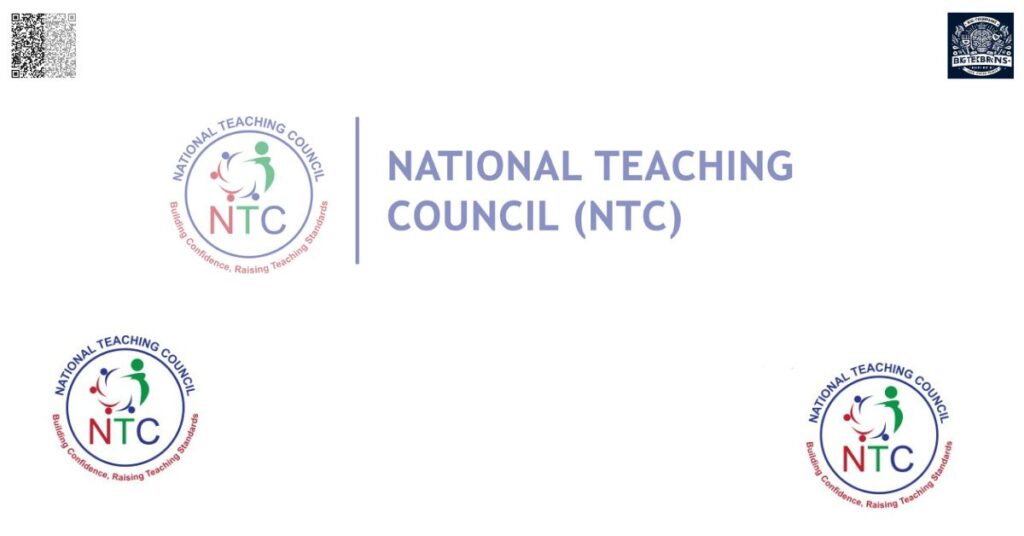Excerpt
The National Teaching Council (NTC) is a pivotal agency under Ghana’s Ministry of Education, dedicated to enhancing teacher professionalism and educational standards across the nation.
Historical Background
Established under the Education Act of 2008 (Act 778) and further empowered by the Education Regulatory Bodies Act, 2020 (Act 1023), the NTC was created to professionalize teaching in Ghana. Its inception marked a significant step towards formalizing teacher standards and ensuring quality education nationwide.
Constitutional Mandate
The NTC’s core mandates include:
Licensing and Registration:
- Issuing licenses to qualified teachers and maintaining an up-to-date database of educators.
Professional Standards:
- Developing and periodically reviewing professional standards and codes of ethics for teachers.
Teacher Licensure Examination:
- Conducting examinations to assess and certify the competencies of prospective teachers.
Continuous Professional Development (CPD):
- Providing frameworks to ensure ongoing professional growth for teachers.
Accreditation:
- Accrediting teacher education institutions and their programs to maintain high educational standards.
Organizational Structure
The NTC operates through various directorates and departments, each tasked with specific responsibilities:
Public Affairs:
- Manages public relations and communication strategies.
Internal Audit:
- Ensures effective risk management and internal controls.
Legal Services:
- Oversees legal matters and compliance.
Standards and Compliance:
- Monitors adherence to established standards.
Teacher Education and Research:
- Focuses on teacher training programs and research initiatives.
Planning, Monitoring, and Evaluation:
- Assesses the effectiveness of NTC’s programs and initiatives.
Registration and Licensing:
- Manages the teacher registration and licensing processes.
Assessment and Examination:
- Conducts evaluations and examinations for teachers.
Professional Development:
- Facilitates ongoing training and development opportunities for educators.
Finance:
- Handles financial management and budgeting.
Administration:
- Oversees administrative functions and resource management.
Human Resources:
- Manages staffing and personnel development.
Additionally, the NTC has regional offices, such as the Ashanti Regional Office, to represent the Council’s interests across the country.
Leadership and Ranks
The NTC is governed by a board comprising experienced education professionals. As of January 2022, the board is chaired by Mr. Anis Haffar, with Dr. Christian Addai-Poku serving as the Registrar. Other notable members include Dr. Mrs. Evelyn Owusu Oduro, Mrs. Catherine Appiah-Pinkrah, and Dr. Edward Appiah.
Mode of Appointment and Recruitment
Board members are appointed based on their expertise and contributions to the education sector. The recruitment process for staff involves a merit-based system, ensuring that qualified individuals are selected to uphold the Council’s mandates.
Collaborative Offices and Units
The NTC collaborates with various educational bodies, including:
- National Council for Tertiary Education (NCTE)
- National Accreditation Board (NAB)
- Ghana Education Service (GES)
- National Council for Curriculum and Assessment (NaCCA)
- National Inspectorate Board (NIB)
Achievements
The NTC has made significant strides in professionalizing teaching in Ghana, including:
Implementation of the Teacher Licensure Examination:
- Ensuring that only qualified individuals enter the teaching profession.
Development of Professional Standards:
- Establishing clear guidelines and expectations for teacher performance and ethics.
Promotion of Continuous Professional Development:
- Encouraging teachers to engage in lifelong learning to enhance their skills.
Constitutional Reforms
- The enactment of the Education Regulatory Bodies Act, 2020 (Act 1023) was a significant reform that redefined the NTC’s role, granting it broader authority to regulate teacher education and professionalism in Ghana.
References
- https://coverghana.com.gh/mandates-of-the-national-teaching-council-ntc/
- https://ntc.gov.gh/mandate/
- https://ntc.gov.gh/wp-content/uploads/2024/RTI%20MANUAL%202024%20.pdf
- https://coverghana.com.gh/the-governing-board-members-of-national-teaching-council-ntc/
- https://teachertaskforce.org/sites/default/files/2023-02/2017_MoE-Ghana_National-Teachers-Standards-for-Ghana_EN.pdf
- https://icreategh.com/what-you-should-know-about-the-national-teaching-council-ntc-of-ghana/
- https://educationghana.org/mandate-of-the-national-teaching-council-ntc/
- https://ntc.gov.gh/wp-content/uploads/2021/12/FINAL-CPD-REVIEWED-29-06-21-3.pdf
- https://ntc.gov.gh/wp-content/uploads/2021/12/NTS.pdf
- https://www.idpublications.org/wp-content/uploads/2020/08/Full-Paper-IMPLEMENTING-THE-NEW-NATIONAL-TEACHER-EDUCATION-CURRICULUM-AT-THE-UNIVERSITY-OF-EDUCATION-WINNEBA-GHANA.pdf
Contact Information
For further inquiries or information, you can reach the National Teaching Council at:
- Address: P. O. Box MB 247 Accra, J273 Institute Drive, GA-076-6021, Opposite University of Ghana City Campus, Adabraka.
- Telephone: 030 298 6325
- Email: info@ntc.gov.gh

